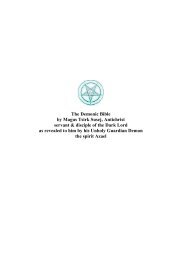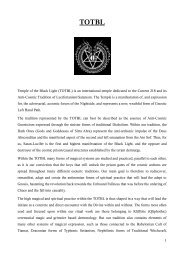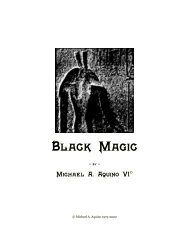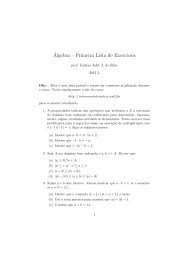I. VAMA MARGA Foundations Of The Left-Hand Path - staticfly.net
I. VAMA MARGA Foundations Of The Left-Hand Path - staticfly.net
I. VAMA MARGA Foundations Of The Left-Hand Path - staticfly.net
Create successful ePaper yourself
Turn your PDF publications into a flip-book with our unique Google optimized e-Paper software.
principle, and Shakti, the female principle. However, exaltation of female<br />
divinity in the world and in one's self (regardless of gender) is the true focus<br />
of the left-hand. path, perhaps expressed most dramatically in kundalini, the<br />
awakening of Shakti within one's own body. We view these exercises as<br />
means to the greater objective of personal attainment of an independent godlike<br />
consciousness in this lifetime, the act of self-deification.<br />
Sorcery<br />
We shall also frequently refer to the magician as a sorcerer or sorceress, one<br />
who practices the art of sorcery. <strong>The</strong>se words – which have come to be<br />
interchangeable with magician or magic – derive from the Latin sortiarius,<br />
one who throws or declares a lot, originally for purposes of divination.<br />
However, through modem usage of the word, the practice of sorcery can be<br />
understood as a more specific type of magic. For our purposes, sorcery is<br />
understood to center on the stratagem of orchestrating a pre-determined<br />
transformation in the world apparently outside of the magician's psyche by<br />
making use of physical objects, words, thought patterns, to effect that change.<br />
155<br />
In the case of erotic sorcery, the manipulation of sexual energy obviously<br />
constitutes the principal means of effecting the desired alteration of reality.<br />
One exemplar of sorcery would he the utilization of magic to cast a<br />
spell on another human being. Since we will be concentrating on sexual<br />
sorcery in this volume, perhaps the simplest and most obvious basic instance<br />
of this technique would be the magically inspired creation of a magical<br />
surrogate that represents the object of your lust, a form of sympathetic magic.<br />
<strong>The</strong> sorcerer performs a magical operation in which willed concentration,<br />
altered state of consciousness and powerful imagination are focused on the<br />
object that serves as a substitute for the person you desire. You essentially<br />
convince yourself, through the controlled and temporary suspension of<br />
ordinary brain function, that the symbolic representation is the individual you<br />
are lusting after. By changing that object and bringing it under the control of<br />
your magically heightened consciousness you are changing – or at least<br />
greatly influencing – the actual person you long for. <strong>The</strong> advanced sorcerer<br />
can far exceed such simple mechanics in both subtlety and method but the<br />
underlying principle of sorcery is the same no matter how sophisticated the<br />
application.<br />
Since, depending on one's point of view, certain mechanical aspects<br />
of the mind itself may be considered an object outside of the magician's core<br />
self, it may well be that sorcery can include the transformation of the<br />
sorcerer's own mental processes. Granting that truly precise definition can be<br />
blurred through such fine points, we prefer to classify the kind of magic that<br />
aims to change the inner self rather than the outer world – as interconnected<br />
as these may be – as being of an initiatory (rather than a sorcerous)<br />
character.<br />
<strong>The</strong> ancients generally understood most other forms of magic to fall<br />
under the category of thamatourgia or "wonder-working" from the Greek<br />
thauma = wonder + ergon = work. When the sex magician creates changes<br />
in the inner or outer world that seem to defy the known laws of cause and<br />
effect by transforming the body and psyche through any deliberate alteration<br />
of consciousness, the results must surely seem wondrous and even<br />
miraculous to the non-magician. Thus, thaumaturgy can be used to describe<br />
almost any form of magical operation.<br />
Initiation<br />
Just as we consign magical actions focused on altering the seemingly<br />
external universe as the work of the sorcerer, we designate the more difficult<br />
work of self-modification as initiation, the work of the initiate. Initiation, a<br />
word derived from the Latin initiare, which simply means to enter upon or<br />
to begin, is a word fraught with many unfortunate cultural associations that<br />
need to be dispelled before proceeding. One immediately thinks of being
















